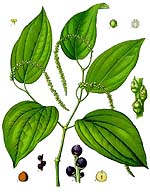The Health Benefits of Black Pepper

Black pepper is derived from the fruit of a climbing vine native to southern India and Sri Lanka. White pepper is likewise made from this fruit but is processed differently. Used almost universally, black pepper is one of the most common condiments worldwide and figures prominently in most curry recipes. It is also frequently included in the prescriptions of Ayurvedic and other traditional health practitioners. The spicy tang of black pepper is due to its most important and well-researched phytochemical, piperine.
Thanks to many of its constituent compounds such as eugenol, kaempferol, myrcene, quercetin and rutin black pepper is a much more effective antioxidant than many fruit and vegetables.
Moreover it contains the unique compound, piperine, which is capable of enhancing the bioavailability of important nutritive compounds in other foods and spices.
Medicinal Properties of Black Pepper
Cancer
By increasing the bioavailability of other anti-tumourigenic spices, black pepper dramatically increases their potency and effectiveness against cancer. In addition to this important property, black pepper also counteracts cancer development directly. Its principal phytochemical, piperine, inhibits some of the pro-inflammatory cytokines that are produced by tumour cells. In so doing it interferes with the signalling mechanisms between cancer cells, thereby reducing the chances of tumour progression. Collectively, these properties make black pepper one of the most important spices for preventing cancer.
Oxidative stress
Black pepper contains several powerful antioxidants and is thus one of the most important spices for preventing and curtailing oxidative stress. In addition to their direct antioxidant properties, several of these compounds work indirectly by enhancing the action of other antioxidants. This makes black pepper particularly valuable in minimising the damage caused by a diet rich in saturated fats, one of the main causes of oxidative stress.
The high levels of cholesterol and triglycerides associated with oxidative stress inhibit the efficacy of important antioxidants like glutathione, superoxide dismutase, catalase, glutathione peroxidase, vitamin C and vitamin E. However, in the face of this potentially destructive process, black pepper actually maintains and enhances the levels and efficacy of these important antioxidant compounds.
Immunomodulation
Black pepper exhibits immunomodulatory properties and is capable of boosting the number and the efficacy of white cells, thereby assisting the body to mount a powerful defense against invading microbes and cancer cells.
Bioavailability enhancement
Piperine increases the bioavailability of valuable phytochemicals present in other spices and can boost the activity of biochemically active compounds contained in green tea, curcumin and a variety of other spices by up to several hundred percent, depending on the molecule concerned. It does this via two principal mechanisms. First, it promotes the rapid absorption of certain chemicals from the gastrointestinal tract, protecting them from being broken down by chemicals in the intestinal lumen and by enzymes that occur in the cells lining the intestines. Secondly, once the compound has entered the blood stream, piperine provides protection against oxidative damage by liver enzymes. In this way black pepper enables us to reap optimum benefits from the medicinal phytochemicals found in other dietary spices.
Its bioavailability enhancing properties makes black pepper one of the most important spices. It should be added to recipes and meals as often as possible as it boosts the medicinal value of many spices and other foods.
About The Author:
Keith Scott is a medical doctor who has a special interest in nutritional medicine. He has written several books on health related topics including Medicinal Seasonings, The Healing Power Of Spices and Natural Home Pharmacy.
|